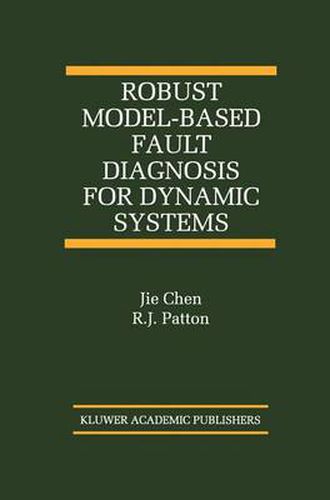Readings Newsletter
Become a Readings Member to make your shopping experience even easier.
Sign in or sign up for free!
You’re not far away from qualifying for FREE standard shipping within Australia
You’ve qualified for FREE standard shipping within Australia
The cart is loading…






This title is printed to order. This book may have been self-published. If so, we cannot guarantee the quality of the content. In the main most books will have gone through the editing process however some may not. We therefore suggest that you be aware of this before ordering this book. If in doubt check either the author or publisher’s details as we are unable to accept any returns unless they are faulty. Please contact us if you have any questions.
There is an increasing demand for dynamic systems to become more safe and reliable. This requirement extends beyond the normally accepted safety-critical systems of nuclear reactors and aircraft where safety is paramount important, to systems such as autonomous vehicles and fast railways where the system availability is vital. It is clear that fault diagnosis (including fault detection and isolation, FDI) has been becoming an important subject in modern control theory and practice. For example, the number of papers on FDI presented in many control-related conferences has been increasing steadily. The subject of fault detection and isolation continues to mature to an established field of research in control engineering. A large amount of knowledge on model-based fault diagnosis has been ac cumulated through the literature since the beginning of the 1970s. However, publications are scattered over many papers and a few edited books. Up to the end of 1997, there is no any book which presents the subject in an unified framework. The consequence of this is the lack of common language , dif ferent researchers use different terminology. This problem has obstructed the progress of model-based FDI techniques and has been causing great concern in research community. Many survey papers have been published to tackle this problem. However, a book which presents the materials in a unified format and provides a comprehensive foundation of model-based FDI is urgently needed.
$9.00 standard shipping within Australia
FREE standard shipping within Australia for orders over $100.00
Express & International shipping calculated at checkout
Stock availability can be subject to change without notice. We recommend calling the shop or contacting our online team to check availability of low stock items. Please see our Shopping Online page for more details.
This title is printed to order. This book may have been self-published. If so, we cannot guarantee the quality of the content. In the main most books will have gone through the editing process however some may not. We therefore suggest that you be aware of this before ordering this book. If in doubt check either the author or publisher’s details as we are unable to accept any returns unless they are faulty. Please contact us if you have any questions.
There is an increasing demand for dynamic systems to become more safe and reliable. This requirement extends beyond the normally accepted safety-critical systems of nuclear reactors and aircraft where safety is paramount important, to systems such as autonomous vehicles and fast railways where the system availability is vital. It is clear that fault diagnosis (including fault detection and isolation, FDI) has been becoming an important subject in modern control theory and practice. For example, the number of papers on FDI presented in many control-related conferences has been increasing steadily. The subject of fault detection and isolation continues to mature to an established field of research in control engineering. A large amount of knowledge on model-based fault diagnosis has been ac cumulated through the literature since the beginning of the 1970s. However, publications are scattered over many papers and a few edited books. Up to the end of 1997, there is no any book which presents the subject in an unified framework. The consequence of this is the lack of common language , dif ferent researchers use different terminology. This problem has obstructed the progress of model-based FDI techniques and has been causing great concern in research community. Many survey papers have been published to tackle this problem. However, a book which presents the materials in a unified format and provides a comprehensive foundation of model-based FDI is urgently needed.